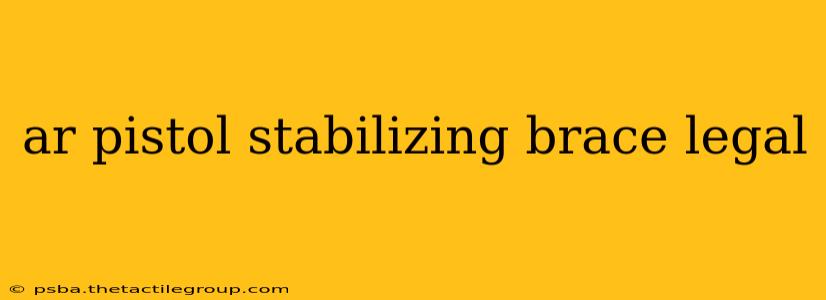The legality of AR pistol stabilizing braces remains a complex and often confusing issue. While initially marketed and largely understood as accessories that aid in firearm stabilization without triggering the National Firearms Act (NFA) regulations on short-barreled rifles (SBRs), recent legal interpretations and enforcement actions have cast a shadow of uncertainty over their status. This article will delve into the current legal landscape, clarifying common misconceptions and highlighting the key factors that determine legality.
The ATF's Shifting Stance on Stabilizing Braces
The Bureau of Alcohol, Tobacco, Firearms and Explosives (ATF) has played a significant role in shaping the legal interpretation of AR pistol stabilizing braces. Initially, the ATF allowed the use of these braces under the understanding that they were designed to mitigate recoil and improve accuracy for individuals with disabilities, particularly those lacking upper body strength. This interpretation focused on the intended use of the brace.
However, in recent years, the ATF's stance has hardened. They've increasingly focused on how the braces are actually used in practice. This shift has led to enforcement actions against individuals who, despite owning braces legally acquired, have been found to use them in a manner that the ATF interprets as converting the pistol into a short-barreled rifle, effectively circumventing NFA regulations.
This change represents a crucial point: the legality isn't solely about the brace itself; it's intricately linked to the user's actions and the manner in which the brace is utilized.
Key Factors Influencing Legality
Several key factors determine whether the use of an AR pistol stabilizing brace remains legal:
-
Method of Use: Shouldering the brace, actively using it to stabilize the weapon against the shoulder, is now frequently cited as the primary indicator of illegal conversion to an SBR. The ATF's emphasis on how the brace is used rather than the brace's design itself has heightened the ambiguity.
-
Modifications to the Brace or Firearm: Any modification to the brace or the firearm that enhances its functionality when shouldered may lead to legal challenges. This includes alterations designed to increase comfort or stability when the brace is used against the shoulder.
-
Intent of the User: While difficult to prove definitively, the ATF considers the user's intent in purchasing and using the brace. If the intent was to circumvent NFA regulations by using the brace as a makeshift stock, legal ramifications may follow.
-
State Laws: It's crucial to remember that federal laws regarding AR pistol stabilizing braces interact with state laws. Some states have enacted stricter regulations, further complicating the legal landscape. Always verify your state's specific laws regarding firearms.
Navigating the Legal Maze: Recommendations for Responsible Ownership
Given the evolving legal situation, responsible firearm ownership necessitates caution and thorough understanding. Here are some recommendations:
-
Stay Informed: Continuously monitor changes in ATF rulings and interpretations. The legal environment is dynamic, and awareness of updates is essential.
-
Consult Legal Counsel: If you own an AR pistol with a stabilizing brace, consulting with an attorney specializing in firearms law is highly advisable. They can provide personalized guidance based on your specific circumstances.
-
Use Caution: Avoid shouldering the brace. Use it strictly as a stabilizing device, as originally intended, and refrain from any modifications that could be interpreted as converting the pistol into an SBR.
-
Accurate Record Keeping: Maintain comprehensive records of all purchases and modifications related to your firearm and brace.
Disclaimer: This article provides informational purposes only and does not constitute legal advice. The information provided here is based on current understanding of the law; however, legal interpretations can change, and individual situations may vary. Always consult with a qualified legal professional for guidance on firearms laws and regulations.

